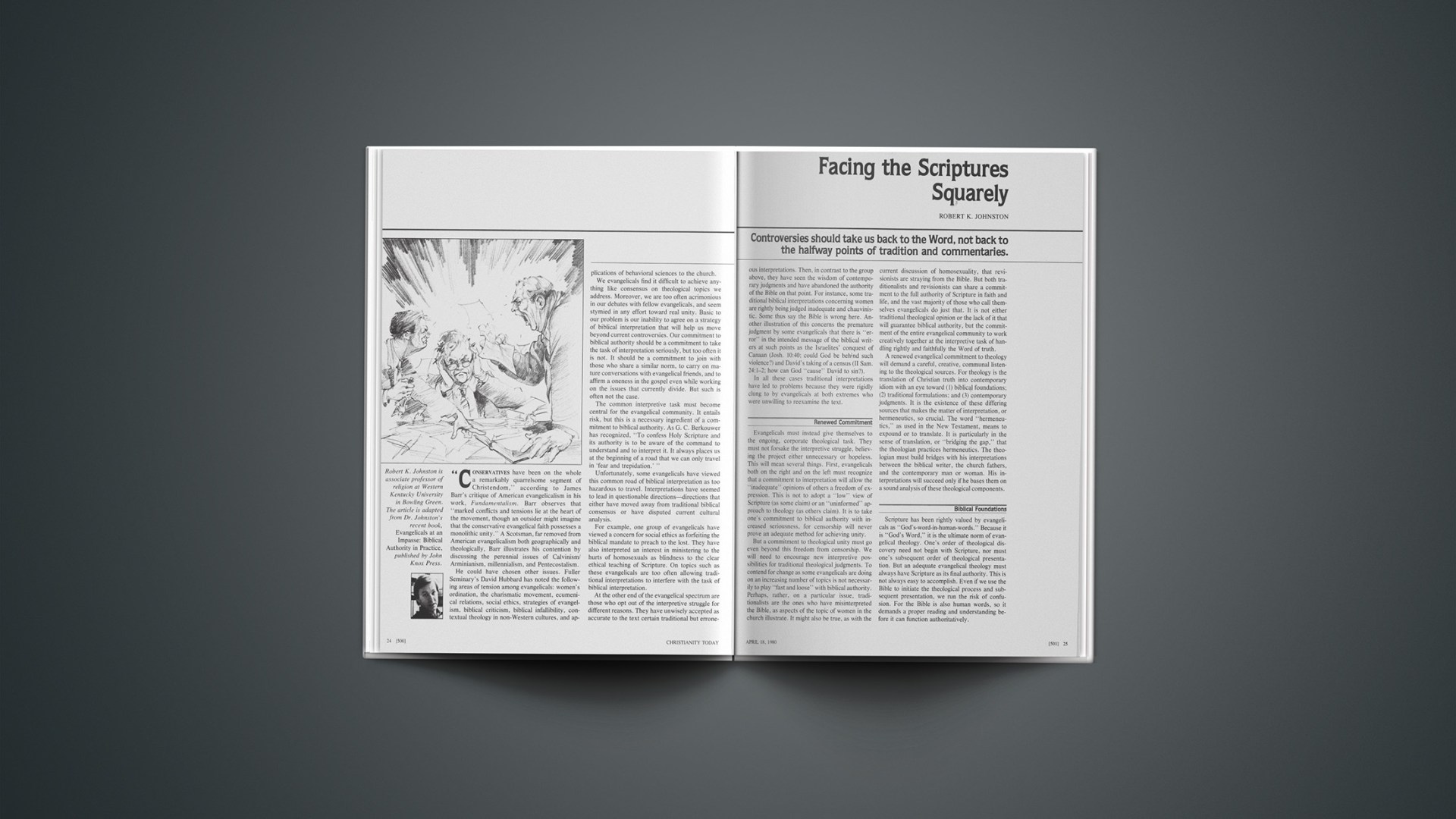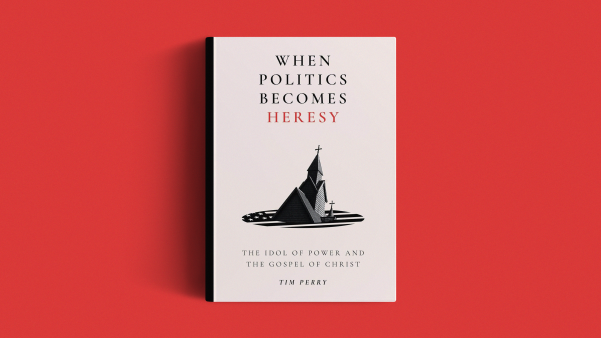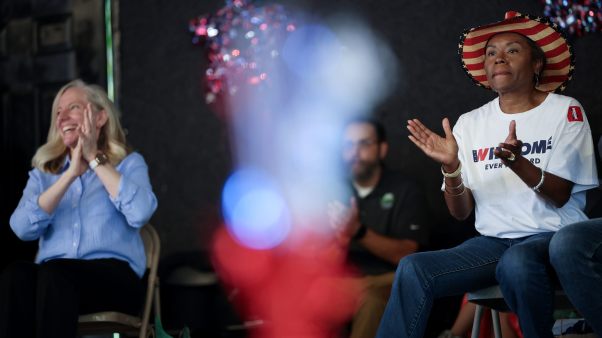Controversies should take us back to the Word, not back to the halfway points of tradition and commentaries.
“Conservatives have been on the whole a remarkably quarrelsome segment of Christendom,” according to James Barr’s critique of American evangelicalism in his work, Fundamentalism. Barr observes that “marked conflicts and tensions lie at the heart of the movement, though an outsider might imagine that the conservative evangelical faith possesses a monolithic unity.” A Scotsman, far removed from American evangelicalism both geographically and theologically, Barr illustrates his contention by discussing the perennial issues of Calvinism/Arminianism, millennialism, and Pentecostalism.
He could have chosen other issues. Fuller Seminary’s David Hubbard has noted the following areas of tension among evangelicals: women’s ordination, the charismatic movement, ecumenical relations, social ethics, strategies of evangelism, biblical criticism, biblical infallibility, contextual theology in non-Western cultures, and applications of behavioral sciences to the church.
We evangelicals find it difficult to achieve anything like consensus on theological topics we address. Moreover, we are too often acrimonious in our debates with fellow evangelicals, and seem stymied in any effort toward real unity. Basic to our problem is our inability to agree on a strategy of biblical interpretation that will help us move beyond current controversies. Our commitment to biblical authority should be a commitment to take the task of interpretation seriously, but too often it is not. It should be a commitment to join with those who share a similar norm, to carry on mature conversations with evangelical friends, and to affirm a oneness in the gospel even while working on the issues that currently divide. But such is often not the case.
The common interpretive task must become central for the evangelical community. It entails risk, but this is a necessary ingredient of a commitment to biblical authority. As G. C. Berkouwer has recognized, “To confess Holy Scripture and its authority is to be aware of the command to understand and to interpret it. It always places us at the beginning of a road that we can only travel in ‘fear and trepidation.’ ”
Unfortunately, some evangelicals have viewed this common road of biblical interpretation as too hazardous to travel. Interpretations have seemed to lead in questionable directions—directions that either have moved away from traditional biblical consensus or have disputed current cultural analysis.
For example, one group of evangelicals have viewed a concern for social ethics as forfeiting the biblical mandate to preach to the lost. They have also interpreted an interest in ministering to the hurts of homosexuals as blindness to the clear ethical teaching of Scripture. On topics such as these evangelicals are too often allowing traditional interpretations to interfere with the task of biblical interpretation.
At the other end of the evangelical spectrum are those who opt out of the interpretive struggle for different reasons. They have unwisely accepted as accurate to the text certain traditional but erroneous interpretations. Then, in contrast to the group above, they have seen the wisdom of contemporary judgments and have abandoned the authority of the Bible on that point. For instance, some traditional biblical interpretations concerning women are rightly being judged inadequate and chauvinistic. Some thus say the Bible is wrong here. Another illustration of this concerns the premature judgment by some evangelicals that there is “error” in the intended message of the biblical writers at such points as the Israelites’ conquest of Canaan (Josh. 10:40; could God be behind such violence?) and David’s taking of a census (2 Sam. 24:1–2; how can God “cause” David to sin?).
In all these cases traditional interpretations have led to problems because they were rigidly clung to by evangelicals at both extremes who were unwilling to reexamine the text.
Renewed Commitment
Evangelicals must instead give themselves to the ongoing, corporate theological task. They must not forsake the interpretive struggle, believing the project either unnecessary or hopeless. This will mean several things. First, evangelicals both on the right and on the left must recognize that a commitment to interpretation will allow the “inadequate” opinions of others a freedom of expression. This is not to adopt a “low” view of Scripture (as some claim) or an “uninformed” approach to theology (as others claim). It is to take one’s commitment to biblical authority with increased seriousness, for censorship will never prove an adequate method for achieving unity.
But a commitment to theological unity must go even beyond this freedom from censorship. We will need to encourage new interpretive possibilities for traditional theological judgments. To contend for change as some evangelicals are doing on an increasing number of topics is not necessarily to play “fast and loose” with biblical authority. Perhaps, rather, on a particular issue, traditionalists are the ones who have misinterpreted the Bible, as aspects of the topic of women in the church illustrate. It might also be true, as with the current discussion of homosexuality, that revisionists are straying from the Bible. But both traditionalists and revisionists can share a commitment to the full authority of Scripture in faith and life, and the vast majority of those who call themselves evangelicals do just that. It is not either traditional theological opinion or the lack of it that will guarantee biblical authority, but the commitment of the entire evangelical community to work creatively together at the interpretive task of handling rightly and faithfully the Word of truth.
A renewed evangelical commitment to theology will demand a careful, creative, communal listening to the theological sources. For theology is the translation of Christian truth into contemporary idiom with an eye toward (1) biblical foundations; (2) traditional formulations; and (3) contemporary judgments. It is the existence of these differing sources that makes the matter of interpretation, or hermeneutics, so crucial. The word “hermeneutics,” as used in the New Testament, means to expound or to translate. It is particularly in the sense of translation, or “bridging the gap,” that the theologian practices hermeneutics. The theologian must build bridges with his interpretations between the biblical writer, the church fathers, and the contemporary man or woman. His interpretations will succeed only if he bases them on a sound analysis of these theological components.
Biblical Foundations
Scripture has been rightly valued by evangelicals as “God’s-word-in-human-words.” Because it is “God’s Word,” it is the ultimate norm of evangelical theology. One’s order of theological discovery need not begin with Scripture, nor must one’s subsequent order of theological presentation. But an adequate evangelical theology must always have Scripture as its final authority. This is not always easy to accomplish. Even if we use the Bible to initiate the theological process and subsequent presentation, we run the risk of confusion. For the Bible is also human words, so it demands a proper reading and understanding before it can function authoritatively.
The task of careful, critical, biblical scholarship has perhaps never been as apparent as today. But even this does not insure biblical authority. Perhaps the key issue in allowing Scripture to be heard on its own terms is the recognition that even the biblical interpreter must be a bridge builder. Biblical theologians who come to Scripture must overcome the gap that separates their world from that of the biblical writers—a gap that involves language, thought forms, cultural practices, and historical situations. Commenting on Calvin’s recognition of this, Karl Barth wrote of “how energetically Calvin, having first established what stands in the texts, set himself to re-think the whole material and to wrestle with it, till the walls which separate the sixteenth century from the first become transparent! Paul speaks, and the man of the sixteenth century hears. The conversation between the original record and the reader moves round the subject-matter, until a distinction between yesterday and today becomes impossible.”
Evangelicals believe that the biblical writers knew of God what others do not know, and their writings allow others to know what they knew. But only if we are open to biblical scholarship and are willing to undertake fresh exegesis can that authoritative message be heard in our day. As John Robertson said centuries ago, “God has yet more truth to break forth from His Holy Word.”
Tradition
Traditional formulations are a second source for contemporary evangelicals as they seek consensus in their theology. To reject the direct study of the Bible would be theological suicide. But to isolate its conclusions from the judgments and experience of the Christian community through the ages is almost as unsatisfactory. John Leith has commented: “The Christian community has a theological maturity and an historical discernment that should not be easily surrendered and which should impinge upon all technical studies of the Scriptures. Augustine, Luther, Calvin, the English Puritans, and Kierkegaard, among others, read Scripture with a profundity of understanding that has not been surpassed by those who are the beneficiaries of modern critical studies.”
As evangelical theology is done “again and again” in each generation, it should not ignore its roots, but rather attempt to translate the truth of previous ages into contemporary expression. It must examine criticially and gratefully all that came before. If, after analysis, it concludes it must reject some part of the corporate convictions of the community of the faithful through the ages, it accepts the burden of proof concerning that change.
Contemporary Judgments
In addition to the need to listen both to the Bible and tradition, the evangelical theologian must also listen to today’s cultural insights. Some evangelicals have been particularly resistant here, but as even Calvin recognized, they need not be. Not only was Calvin’s theology biblical and traditional, but it sought to build bridges between it and the larger secular humanist culture. In his Institutes Calvin argues: “Whenever we come upon these matters in secular writers, let that admirable light of truth shining in them teach us that the mind of man, though fallen and perverted from its wholeness is nevertheless clothed and ornamented with God’s excellent gifts.”
Evangelicals can learn from those like Robert McAfee Brown who argue for cultural input to the theological equation. In his book, The Pseudonyms of God (i.e., those ways God is speaking to man through the disguise of human culture and natural event), Brown argues that “traffic between the gospel and the world travels on a two-way street.”
Brown is not arguing for a natural theology—one that would seek to build from man to God—or for destroying the infinitely qualitative distinction between the two. Rather, he recognizes that within human life and culture the theologian can get evidence of the divine reality with which the resources of Scripture and tradition can interact. Evangelicals have, unfortunately, failed all too often to make use of the world as a third God-given source for theological creativity.
On occasion an evangelical theology will begin with man and not God. But one’s starting point need not be confused with one’s ultimate theological authority. A cultural starting point might well demand a “hermeneutical suspension,” that is, a temporary bracketing of one’s previous understanding of Scripture. But it will also assist in the renewed hermeneutical task, allowing us to experience, understand, and apply the biblical witness in a fresh way.
An Art
Evangelical theology will be a united voice only as we attend to each of the three theological resources, though we can lay down no set of rules that would guarantee the successful interaction between them. All one can say is that the creative dialogue will seek to build bridges between Scripture and church and world in a way appropriate to the subject matter in view. Seen in this light, evangelical theology at its best is an “art”; we entrust to words what we have creatively perceived in the dialogue between Scripture, church, and world.
General consensus is the goal of this risky, communal process of theological interpretation that seeks to give serious thought to Scripture, tradition, and contemporary culture. Obviously, unified opinion does not happen by fiat. It is much more difficult to say, however, how we can achieve such an end. Theological interpretation is only in part a “science.” It is scientific in that its sources and their relations lend themselves to careful analysis, deduction, and critique—whether these are biblical, traditional, or contemporary. Biblical scholars, church historians, and social scientists can offer operational suggestions concerning the theological task. But while we must consider methodological questions carefully, we must remember also, as Bernard Lonergan has observed, that theological “method is not a set of rules to be followed meticulously by a dolt. It is a framework for collaborative creativity.”
Theology remains an art in that if we are properly to value and interact with its sources, we need a wisdom that defies a comprehensive codification. As John Leith suggests, “Theology is wisdom, not precisely defined scientific knowledge. Just as there is a human wisdom that comes with maturity and is the result of the interaction of experience and critical reflection, so there is a theological wisdom that comes with maturity and is the result of the interaction of critical reflection, of experience in the church, of engagement with Scripture, of Christian witness today, and of the testimony of the Holy Spirit.”
Leith continues, quoting Joseph Sittler with approval: “My own disinclination to state a theological method is grounded in the strong conviction that one does not devise a method and then dig into the data; one lives with the data, [and] lets their force, variety, and authenticity generate a sense for what Jean Danielou calls a ‘way of knowing’ appropriate to the nature of the data.”
If contemporary evangelical theologians carried out such an agenda, they might find, for instance, that biblical hermeneutics provided the key to an understanding of the role of women in the church and home. Also, dialogue between those whose traditions that have heard the Word of God differently might hold the key for discussing social ethics. And engagement with the full range of cultural activity (from psychotherapy to radical protest, from personal testimony to scientific statement) might be the focus for theologically evaluating homosexuality. The evangelical should view such differences in theological method as signifying a health in the creative process rather than a confusion over technique. Living with the data and letting them suggest the theological agenda is the necessary approach for evangelicals who want Scripture to remain authoritative in faith and life.
Guidelines
Although an evangelical theologian cannot be programmed for success any more than an artist can paint by number, he can profit from several guidelines.
Community. Primarily, we must recognize theology as the perennial task of the church and for the church. We must do theology in community, not competition. The present pluralism-in-isolation that characterizes much of evangelical thought must give way, as an initial step in the consensus-building process, to a pluralism-in-dialogue. We must face diversity openly and in love, as evangelicals together seeking theological consensus. Moreover, we shall not view even an evangelical consensus as an end in itself, but rather as a tool of the church in strengthening its faith and life. “The theologian’s task,” as Calvin recognized, “is not to divert the ears with chatter, but to strengthen consciences by teaching things true, sure, and profitable.”
Prayer. Second, theology must be done as prayer. It is not merely begun in prayer, or accompanied by prayer. It is in its entirety an act of prayer. This is because the subject matter of theology is the Word of God (his address to man), and because we must always understand theology as our faithful response to that subject.
Humility. Moreover, the prayerful response is made by finite man. The theologian is overwhelmed by the magnitude of what he has received, so he must put his theological constructions forward humbly. Theology must never claim too much for itself.
The evangelical theologian who thinks too highly of his own meager efforts at capturing the truth of a transcendent God has never fully been overcome by the subject matter he is addressing. Prayer and humility are reverse sides of a correct theological posture.
To seek prayerfully and humbly within the believing community a theological consensus, one arising out of biblical, traditional, and contemporary data, is the evangelical’s task. Only in this way can we overcome the current tensions within evangelical thinking. Only in this way can we maintain the evangelical commitment to biblical authority. Only in this way can we achieve a unified voice. Only in this way will the evangelical church be an authentic witness to the Christian faith.
Carl F. H. Henry, first editor of Christianity Today, is lecturer at large for World Vision International. An author of many books, he lives in Arlington, Virginia.










